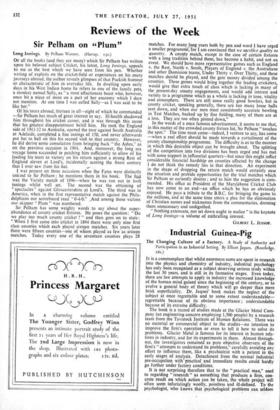Reviews of the Week
Sir Pelham on “Plum"
OF all the books (and they are many) which Sir Pelham has written upon his beloved subject Cricket, his latest, Long Innings, appeals to me as the best which we have seen from his pen. Whether writing of exploits on the cricket-field or experiences on his many journeys abroad, the author reveals glimpses of that Puckish humour so characteristic of him in everyday life. In dwelling upon early days in his West Indian home he refers to one of the family pets, a monkey named Sally, as "a most affectionate beast who, however, once bit a niece of mine on a part of her anatomy which I dare not mention. At one time I was called Sally—as I was said to be like her."
Of his tours abroad, thirteen in all—eight of which he commanded —Sir Pelham has much of great interest to say. Ill-health shadowed him throughout his cricket career, and it was through this cause that his greatest disappointment befell him. He took the England side of 1911-12 to Australia, opened the tour against South Australia at Adelaide, completed a fine innings of 150, and never afterwards put bat to ball on this his second visit to that country. However, he did derive some consolation from bringing back "the Ashes," as on the previous occasion in 1904. And, moreover, the long sea voyage home succeeded in patching him sufficiently to allow of his leading his team to victory on his return against a strong Rest of England eleven at Lord's, incidentally scoring the finest century that I ever saw from his bat.
I was present on three occasions when the Fates were distinctly unkind to Sir Pelham ; he mentions them in his book. The fir,st was the Varsity match of 1896—when he was run out in both innings whilst well set. The second was the obtaining of " spectacles " aga:nst Gloucestershire at Lord's. The third was in America, when in the first representative match against the Phila- delphians our scoreboard read "0-4-0." And among those victims our skipper " Plum " was numbered.
Sir Pelham has some weighty words to say about the super- abundance of county cricket fixtures. He poses the question : "Do we play too much county cricket ? " and then goes on to state : "When I first came into cricket in 1894 there were only nine first class counties which each played sixteen matches. Six years later there were fifteen counties—one of wCom played as few as sixteen matches. Today every one of the seventeen counties plays 28 matches. For many Jong years both by pen and word I have urged a smaller programme, Tor I am convinced that we sacrifice quality to quantity. A county match, except in the case of certain fixtures with a long tradition behind them, has become a habit, and not an event. We should have more representative games such as England v. the Rest, North v. South, Players of England v. the Australians and other Dominion teams, Under Thirty v. Over Thirty, and these matches should be played, and the gate money divided among the counties. These games would bring together the leading cricketers, would give that extra touch of class which is lacking in many of the present-day county engagements, and would add interest and variety to a programme which as a whole is lacking in tone, vitality and atmosphere. There are still some really good bowlers, but in county cricket, speaking generally, there are too many loose balls sent down, and when our men meet consistently accurate bowling in Test Matches, backed up by fine fielding, many of them are at a loss. They are too often pinned down," In the words of a once famous advertisement, it seems to me that, in this matter of the crowded county fixture list, Sir Pelham "touches the spot." The time must come—indeed, I venture to say, has come —when a real effort should be made towards a curtailment of the county championship programme. The difficulty is as to the manner in which this desirable object can be brought about. The splitting of the competition into two divisions has been urged and has met with some support in influential quarters—but -since this might inflict considerable financial hardship on counties affected by the change I do not think the remedy lies in that direction. An experiment in the shape of dropping the return match would certainly ease the situation and proVide opportunities for the trial matches which Sir Pelham so earnestly desires ; and to him the suggestion is com- mended. His office as President of the Marylebone Cricket Club has now come to an end—an office which he has so obviously enjoyed. He pays a tribute to the B.B.C. for bringing the game to the millions, and at the same time utters a plea for the elimination of Christian names and nicknames from the commentaries, deeming them unnecessary and undignified.
"Nothing extenuate, nor set down aught in malice" is the keynote of Long Innings—a volume of enthralling interest.
GILBERT L. JESSOP.


































 Previous page
Previous page